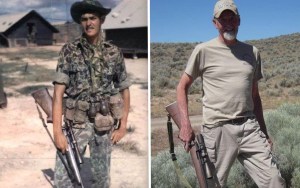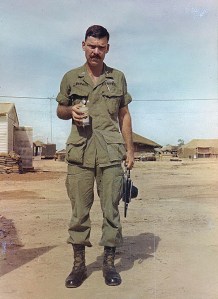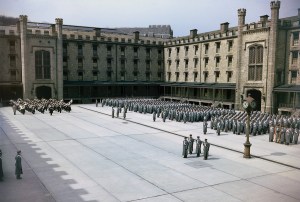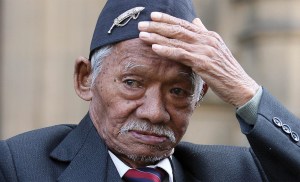
It took Karl Marlantes 30 years to write and publish his first book, Matterhorn. Based on his experiences as an officer and platoon leader in the 3rd Marine Division in Vietnam in the late 1960s, the 2010 novel was hailed as an instant war classic that broke with Vietnam literature of the past. Whatever that war’s controversy, Marlantes makes clear that the men he fought with measured up to the Greatest Generation that took on Adolf Hitler.
Marlantes returns to the subject of heroism in his forthcoming memoir, What It Is Like to Go to War (Atlantic Monthly Press), in which he uses his 13-month tour of duty to explore deep questions on what it means to be a soldier—questions about killing, loyalty, and facing death. In one chapter, he candidly describes how it was his lust for a medal that led him to rescue Utter, a wounded member of his platoon. In the excerpt that follows, he recounts the March 1969 assault on Hill 484 that brought out his true valor. He and three others were awarded the Navy Cross—the most given for one action in Vietnam to a single rifle company.
• • • •
The best words I’ve ever heard on the subject of medals were from a fellow lieutenant who’d been my company XO when I first arrived in Vietnam. The company came under mortar attack. Tom, then a platoon commander, had found a relatively safe defensive position for himself, but he stood up, exposed to the exploding shells, in order to get a compass bearing on where the shells were being fired from. He then called in and adjusted counterbattery fire, which got the company out of the shit. He was awarded the Bronze Star. When I congratulated him he said, “A lot of people have done a lot more and gotten a lot less, and a lot of people have done a lot less and gotten a lot more.”
I did a lot of things that day…but the one I’m most proud of is that I simply stood up, in the middle of all that flying metal, and started up the hill all by myself
Medals are all mixed up with hierarchy, politics, and even job descriptions. What is considered normal activity for a grunt, and therefore not worthy of a medal, is likely to be viewed as extraordinary for someone who does the same thing but isn’t a grunt, so he gets a medal and maybe an article in Stars and Stripes. Your common garden-variety grunt is only “doing his job,” and is usually someplace too dangerous to be interviewed by a reporter anyway. Rank counts for the same reasons. Major Smith grabs a grenade and overruns a bunker and it’s at least good for a Bronze Star. If Lance Corporal Smithers does it, it’s likely to go unnoticed, because Smithers did it yesterday and two weeks earlier as well. If the colonel and his favorite haven’t gotten quite enough stuff on their record to assure their next promotion, well, remember that night when they had to leave the Combat Operations Center to piss because they’d had too much beer and the north end of the perimeter had a rocket come in? Well, that certainly showed bravery under fire….It was ever thus.
I got my medals, in part, because I did brave acts but also because the kids liked me, and they spent time writing better eyewitness accounts than they would have if they hadn’t liked me. Had I been an unpopular officer and done exactly the same thing, few, if any, would have bothered. The accounts would have been laconic, to say the least, and the medals probably of a lower order. The only people who will ever know the value of the ribbons on their chests are the people wearing them—and even they can fool themselves, in both directions.
After the experience with Utter I was no longer so anxious to get a medal of any kind. But the same phenomenon of being taken over by something or someone—possessed—still seemed to operate. We had moved up in the dark and waited in the jungle, strung out on line as the jets roared in to bomb the enemy defenses at first light. But, because of a screwup, the jets dropped their bombs on the wrong hill. I screamed bloody murder over the battalion Forward Air Command net, but was told I was out of line and to get off because I couldn’t possibly see what was going on.
Going up against bunkers is hard enough, but doing it without any air prep was decidedly unnerving. A huge value of the air prep is the boost to the morale of the attacking infantry. We came out of the jungle onto the exposed earth below the bunkers and were instantly under fire from the untouched machine gun positions. Everyone dove for logs and holes. The whole assault ground to a halt, except for one kid named Niemi, who sprinted forward and disappeared up in front of us somewhere. We figured he was down and dead.
I actually don’t know how long we lay there getting pulverized out in the open like that. I knew it would be only a few minutes before the North Vietnamese rockets and mortars found us.
I remember surveying the whole scene from someplace in the air above it. I saw the napalm smoke burning uselessly on the wrong hill. The machine guns had us pinned down with well-planned interlocking fire. The NVA were pros. Everyone was strung out in a ragged line hiding behind downed trees and in shell holes, even me, tiny and small, huddled down there below with the rest. I distinctly remember recalling the words of an instructor at the Basic School, a particularly colorful and popular redheaded major who taught tactics, talking to a group of us about when it was that a platoon leader earned his pay. I knew, floating above that mess, that now that time had come. If I didn’t get up and lead, we’d get wiped.
I reentered my body as the Hero Platoon Leader, leaving everyday me up there in the clouds. It was at this point I started screaming at the wounded machine gunner to crawl up to my log and start that machine gun duel, which would keep the crew of one of the interlocking machine guns busy. Next, I got an M-79 man to move up next to me and had him start launching grenades at the observation slit of an adjacent bunker directly up the hill that was also giving us fits.
Then I stood up.
I did a lot of things that day, many of which got written into the commendation, but the one I’m most proud of is that I simply stood up, in the middle of all that flying metal, and started up the hill all by myself.
I’m proud of that act because I did it for the right reasons. I once watched a television show that featured Bill Moyers and the mythology scholar Joseph Campbell discussing the hero’s journey. The camera had cut to a boot camp scene with Campbell saying, “There are some heroic journeys into which you are thrown and pitched.” The camera then cut to scenes from Vietnam, helicopters, a young black man limping forward in agony. Then it cut to war protesters, and Moyers asked Campbell, “Doesn’t heroism have a moral objective?”
Campbell replied, “The moral objective is that of saving a people, or person, or idea. [The hero] is sacrificing himself for something. That is the morality of it. Now, you, from another position, might say that ‘something’ wasn’t worth it, or was downright wrong. That’s a judgment from another side. But it doesn’t destroy the heroism of what was done. Absolutely not.”
I was no more heroic this time than when I went after Utter. Both times, I faced a lot of fire. In fact, both times my actions were an effort to save something—a person, Utter, or a people, my little tribe exposed and dying on that scourged hillside. But this time my motives had changed. And because my motives had changed, I feel a lot better about what I did.
I made no heroic gestures or wisecracks. I just ran forward up the steep hill, zigzagging for the bunker, hoping the M-79 man wouldn’t hit me in the back. It’s hard to zigzag while running uphill loaded with ammunition and grenades. Every bit of my consciousness was focused on just two things: the bunker above me and whether I could keep running and zigzagging with everything I had. Another 400-meter sprint with Death. A long, desperate weekend. A time out of time.
I was running in a long arc to get between the machine gun bunker and the one I was heading for, and to avoid the M-79 shells now exploding against the observation slit, hopefully blinding the occupants. As I made that arc I was turned sideways to the hill, and I caught movement in my peripheral vision. I hit the deck, turning and rolling, coming up in a position to fire. It was a Marine! He was about 15 meters below me, zigzagging, falling, up and running again. Immediately behind him a long, ragged line of Marines was moving and weaving up the hill behind me. Behind the line were spots of crumpled bodies, lying where they’d been hit.
They’d all come with me. I was actually only alone for a matter of seconds.
We took the bunker, and the next, and together with the 2nd Platoon joining up with us on our right flank, broke through the first line of bunkers, only to come under fire from a second, interior line of fighting holes higher up the hill. That’s when I saw the missing kid, Niemi, pop his head up. He sprinted across the open top of the hill, all alone. The NVA turned in their positions to fire on him. I watched him climb on top of a bunker and chuck two grenades inside. When they went off I saw him fall to the ground. I assumed that this time he’d been killed for sure.
Being hit from behind by Niemi unnerved the NVA and encouraged us to hurry to reach him. All semblance of platoon and squad order was gone by now. Everyone was intermingled, weaving, rushing, and covering, taking on each hole and bunker one at a time in individual groups.
Just then I got knocked out and blinded by a hand grenade. I came to, groggy. I could hear my radioman, who seemed very far away, telling the skipper I was down, and he didn’t know if I was dead or not. I grunted something to let him know I wasn’t dead and tried to sit up, but went back down. I felt like I couldn’t get my breath. Then I panicked, because I knew I’d been hit in the eyes. I started rubbing them, desperate to keep them open, but they seemed glued shut. My radioman poured Kool-Aid from his canteen onto my face and into my eyes, and I managed to get one eye clear. The other eye was a bloody, dirt-clogged mess, and I thought I’d lost it.
We kept scrambling for the top, trying to reach Niemi, trying to win, trying to get it all over with. I got held up by two enemy soldiers in a hole and was attempting to get a shot or two off at them and quickly ducking back down, when a kid I knew from 2nd Platoon, mainly because of his bad reputation, threw himself down beside me, half his clothes blown away. He was begging people for a rifle. His had been blown out of his hands.
He was a black kid, all tangled up in Black Power politics, almost always angry and sullen. A “troublemaker.” Yet here he was, most of his body naked with only flapping rags left of his jungle utilities, begging for a rifle when he had a perfect excuse to just bury his head in the clay and quit. I gave him mine. I still had a pistol. He grabbed it, stood up to his full height, exposing himself to all the fire, and simply blasted an entire magazine at the two enemy soldiers in front of us, killing both. He then went charging into the fight, leaving me stunned for a moment.
Why? Who was he doing this for? What is this thing in young men? We were beyond ourselves, beyond politics, beyond good and evil. This was transcendence.
Many of us had by now worked our way almost to the top of the hill. Fighting was no longer them above and us below. Marines and NVA were all intermingled. Crashing out of the clouds into this confusion came a flaming, smoking twin-rotor CH-46 helicopter. It was making a much-needed ammunition run to the company waiting in reserve and firing support for us from the hill we’d taken several days before. We think the bird got hit by a mortar round as it was coming in; maybe in the confusing and scudding cloud cover the pilot picked the wrong hill, or maybe he did it because he had no choice. The result was the same. Down it came, right where we were assaulting, and the NVA just tore the bird to pieces. Spinning out of control, it smashed right on the very top of the hill, breaking its rotor blades.
I saw Niemi pop into sight again. He sprinted to the downed chopper. He’d watched aghast as the chopper came screaming out of the sky, nearly hitting him. Later he told me it looked like the thing had started sprouting holes as the NVA turned their weapons on it. When he saw the crew bail out and crawl under the chopper for cover, the only thing he could think to do was sprint across the open hilltop to try to find a place from which he could lay down fire to protect them. He didn’t debate this. He just did it. It was an unconscious, generous, and potentially sacrificial act.
Many of us coming up the hill saw Niemi sprint into the open. Knowing now that he was still alive and that he and the chopper crew were dead for sure if we didn’t break through to them, we all rushed forward to reach them before the NVA killed them. No one gave an order. We, the group, just rushed forward all at once. We couldn’t be stopped. Just individuals of us were stopped, many forever. But we couldn’t be. This, too, is a form of transcendence. I was we, no longer me.
Lance Corporal Steel, 19, who’d been acting platoon commander until I reorganized things and was now acting platoon sergeant, got there first. The crew was so grateful and happy they gave their pistols away. I got the pilot’s .38 Smith and Wesson.
Niemi got a Navy Cross.
I got a Navy Cross.
The helicopter pilot got a front-page newspaper story with the headline, copter ‘crashes’ enemy party, takes hill.
The kid who borrowed my rifle didn’t get anything.
Excerpted from What It Is Like to Go to War, by Karl Marlantes (available from Atlantic Monthly Press on August 30). Copyright © 2011 Karl Marlantes. All names are pseudonyms.





